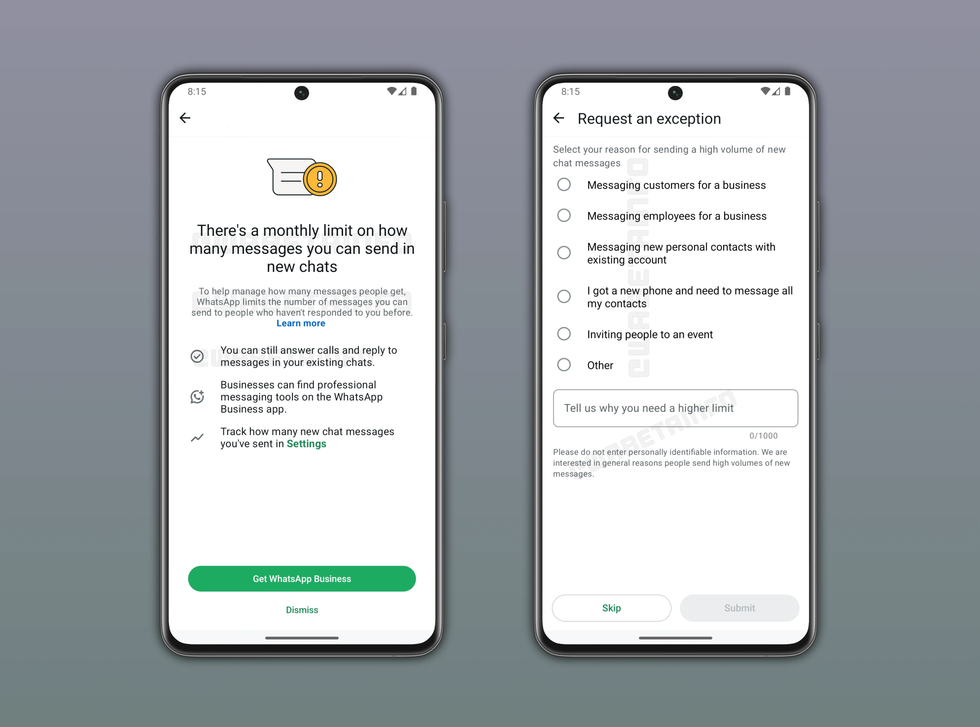WhatsApp want to impose a limit on the number of text messages you can send

Messaging platform used by 1.5 billion people has yet to decide on the threshold
- WhatsApp will add restrictions to your account if you send too many texts
- Only text messages that don't receive a reply count towards the limit
- It's designed to stop users and businesses from spamming people
Don't Miss
Most Read
If you're someone who sends dozens of messages on WhatsApp every day, you might be worried about the latest feature being trialled by the messaging platform.
Code unearthed in a beta version of WhatsApp reveals the world's most popular messenger is looking to introduce a monthly limit on how many messages you can send to people who don't reply to you.
But before you panic about your group chats and daily conversations, here's the good news: this new restriction is aimed at spammers and businesses that bombard WhatsApp users with unwanted messages. It's not designed to punish people who send messages that friends or family forget to reply to.
WhatsApp, which is owned and operated by Facebook and Instagram parent company Meta, will begin testing the functionality across several countries in the coming weeks. That means it'll overlap with current trials around the new Liquid Glass design on iPhone.

Spotted in the latest beta version of WhatsApp, the eagle-eyed team at WABetaInfo shared screenshots of text message limits. Once this feature becomes available, this limit will apply to both individuals and businesses who try to message people they haven't heard back from
|Here's how it will work — every message you send to someone who doesn't respond counts against your monthly allowance. Send three messages to that person from the conference who never replied?
That's three strikes against your limit.
The clever bit is that as soon as someone replies, those messages no longer count. You'll see a pop-up warning when you're getting close to the cap, showing exactly how many messages you have left. This gives you time to adjust your messaging habits before hitting the limit and potentially being blocked from contacting new people.
WhatsApp is the most popular messaging app on the planet, with 1.5 billion people using its service every day.
The company has reassured that typical users who chat with friends and family won't notice any difference when the limitation is introduced. The only difference will be that bulk messages and spam should be less frequent.
LATEST DEVELOPMENTS
The restrictions are specifically designed to catch those who blast out bulk messages and spam.
The good news for regular WhatsApp users is that you're unlikely to hit these limits. The company hasn't confirmed the exact number yet since they're still testing different thresholds to find the sweet spot. The goal is to set a limit high enough that normal users won't encounter it, even when using a broadcast list or something similar to send an invite to multiple people, but low enough to stop spammers in their tracks.
This isn't WhatsApp's first attempt at fighting spam. The Meta-owned company has been busy introducing anti-spam tools over the past year, including letting you unsubscribe from business marketing messages and alerting you when someone outside your contacts adds you to a group.
The scale of the problem is massive – WhatsApp banned more than 6.8 million accounts connected to scam centres in just the first half of 2025. Meanwhile, figures from the Office of National Statistics show an eye-watering 4.2 million incidents of fraud were reported between March 2024 and March 2024 in the UK, that's 81,000 attacks every single week.
These tools arrive as criminal organisations increasingly target WhatsApp users with sophisticated schemes, from fake employment opportunities to cryptocurrency fraud. The new features focus on protecting you when strangers attempt to make contact, whether through group chats or direct messages.
Incoming message limits are one of several new features launched by WhatsApp in recent weeks, including the ability to check availability with friends and family to schedule a call and AI functionality to rewrite your text messages.
Our Standards: The GB News Editorial Charter










